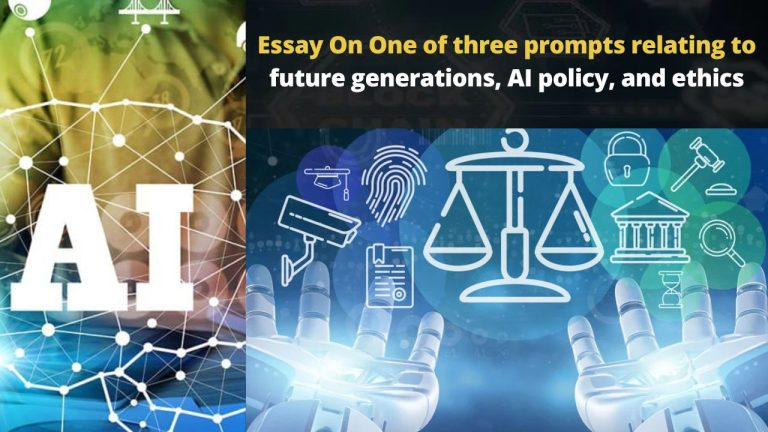"Advertisement"
Essay On One of three prompts relating to future generations, AI policy, and ethics
Hello My Dear Friend, In this post “Essay On One of three prompts relating to future generations, AI policy, and ethics“,
We will be going to read about One of three prompts relating to future generations, AI policy, and Ethics as an Essay in details. So…
Let’s Start…
Essay On One of three prompts relating to future generations, AI policy, and ethics
Introduction
As we approach a new era marked by significant breakthroughs in artificial intelligence (AI), it is more important than ever to address the ethical implications of emerging technologies.
Future generations will be significantly impacted by the legislative and ethical decisions we make now about AI.
We shall examine the complex interplay between AI policy, ethics, and their effects on the welfare of future generations in this essay.
Prompts and Their Significance
Prompt 1: “Discuss the ethical considerations of developing AI technologies that may outstrip human intelligence.”
Artificial General Intelligence (AGI), often known as superintelligent AI, offers incredible prospects as well as imposing ethical dilemmas.
AGI is evolving quickly, raising questions about whether or not these robots will surpass human intellect. If they do, it might change how we perceive the world.
In this situation, ethical issues abound. The possible loss of human jobs and the resulting economic inequality are a serious concern.
We must think about how to deal with the displacement of human employees as we develop AI that can complete tasks more effectively than humans in a variety of sectors.
Comprehensive retraining programs, financial support, and equitably dispersing the advantages are all components of an ethical approach to AGI.
AGI also increases existential risks. Superintelligent AI could endanger humanity if it is not created with moral protections.
Safety measures must be given first priority, and AI objectives must reflect human values. To avoid competitive races without sufficient safety measures, a global consensus on AGI measures is essential.
Prompt 2: “Discuss the role of AI policy in ensuring that future generations inherit a world that respects privacy and individual rights.”
AI has transformed data processing and analysis, thereby eroding individual rights and privacy.
Huge amounts of data are being gathered by governments and organizations, frequently without the knowledge or consent of the data subjects. This is a serious ethical conundrum.
Future generations’ privacy and individual rights are crucially protected by AI policy. Sensitive personal data must be protected by stricter rules and more open disclosure.
To avoid bias and discrimination, AI systems must abide by the principles of fairness, openness, and accountability.
Future generations deserve a world that doesn’t profit off their digital traces. Strong data protection regulations, high encryption standards, and a dedication to user consent should be put first in ethical AI policy.
This will guarantee that AI technologies respect people’s right to privacy and individuality, resulting in a more just and equitable world for future generations.
Prompt 3: “Examine the ethical responsibilities of AI developers and policymakers in shaping a world where AI benefits all of humanity.”
The creation and application of AI technology should be governed by moral standards that put the welfare of all people first.
In order to create a world where AI serves everyone, not just a privileged few, AI developers and politicians must work together.
Issues like bias and discrimination in AI systems are also ethically relevant. AI system designers must make sure their creations are impartial and do not reinforce racial biases.
Government officials should enact laws that make developers answerable for creating biased algorithms.
Additionally, AI should be used to tackle pressing global issues like poverty, healthcare, and climate change.
The goal of ethical AI policy should be to encourage the use of AI for problems that benefit all of humankind. Responsible AI research and initiatives like AI for social good should be promoted and supported.
Conclusion
The welfare of upcoming generations and the development of AI are inextricably linked. We must be attentive in our commitment to ethical AI development as we negotiate the complicated environment of AI policy and ethics.
This calls for addressing the moral questions raised by AGI, defending personal information and rights, and utilizing AI for the good of all humankind.
In summary, AI ethics and policy aren’t just abstract concepts; they’re also useful instruments for influencing the environment we leave our offspring.
We can make sure that the legacy of AI is one of progress, justice, and prosperity for future generations by deliberately and ethically tackling these important problems.
Finally, Thanks For Reading “Essay On One of three prompts relating to future generations, AI policy, and ethics“.
If you have any questions related to “Essay On One of three prompts relating to future generations, AI policy, and ethics“, So, please comment below.
Must Read:
